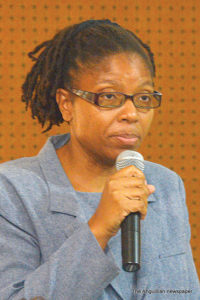
He was asked: “Earlier in your address you mentioned plans, developed in 2017, and the person is asking what are those plans, and how will the people of Anguilla and the Chamber be included in those plans?”
Mrs. Lilly Moses
Mr. Banks responded as follows:
“The first issue that the Government had to face was the aftermath of Hurricane Irma and the first stage of that was relief – and we are now in the recovery stage.
“One of the things that happened as a result of Irma was the severe damage we suffered – not only the private sector but the Government as well. A lot of the infrastructure has been damaged and the Government had to make sure it had the resources available to restore those services. One of those critical services is education. It is important that we protect our young people going forward and we fought the case. The Governor has been an excellent teammate in this and we have been able to work together with the public service, our senior officials, other agencies, colleague ministers, and everybody else to make this happen.
“Through those efforts we were able to get the support of the British Government not in terms of borrowing, but in terms of grant support because we continue to have that as our road march. We don’t need permission to borrow. We need grants to support critical infrastructure for projects that don’t have economic returns. We have been able to obtain that support so the plans for the restoration of the education sector are in place, and we have been working to make a lot of those projects shuttle ready before the end of March. As for the plans for the economy, the day after September 6, last year, the question was: ‘Can we meet our budgetary requirements at the end of the year?’ The Government of Anguilla said no. It is going to be a challenge and we anticipate a deficit of somewhere in the region of twenty-one million dollars.
“Thankfully, based on the CCRIF (Caribbean Catastrophe Risk Insurance Fund), the performance of our revenue, and [assistance from] other agencies, we were able to finance that deficit in 2017. The British Government said it was a challenge to speak to their elected officials to convince their constituencies that they should meet our recurrent requirements. So we were able to negotiate that while the British Government couldn’t meet our recurrent requirements, at least it could assist us with meeting our capital requirements.
“In 2018 we have committed to meeting our recurrent requirements. That means all the payments for services that the economy needs – whether for education services, social services, import trade services, medical services and payment services. We are determined that based on the capital injection not only from the public sector but also the private sector – insurance, hotels, villas and so forth – has enabled us to generate economic activity and as a result generate more revenues to help us meet our budgetary requirements.”
Mr Banks continued: “One of the things I want to do is thank ANGLEC and its CEO, Mr. David Gumbs , the man on the job, his staff and all those persons who came from the region, and also the British Government for getting the workers from Canada whom we thank as well. I think it was a critical achievement to have electricity restored island-wide by Christmas – and it is a helpful environment for the private sector and the entire Anguilla economy.
“We continue to work with the hotel sector to make sure it can get back on stream. We continue to try to find ways and means of supporting people who are out of work, and there are various agencies that are doing a lot of things as well. There are a number of programmes, such as duty-free concessions, to restore businesses. We are looking at the capital funds provided by the British Government to probably establish a fund with the Anguilla Development Board, so that businesses can borrow at concessionary rates for their restoration – as well as some small funds, in addition to the funds that we have from regional agencies and member states, to provide small grants to persons who have had losses.”
The Chief Minister’s statement attracted a lot of applause from all the persons at the business forum.










